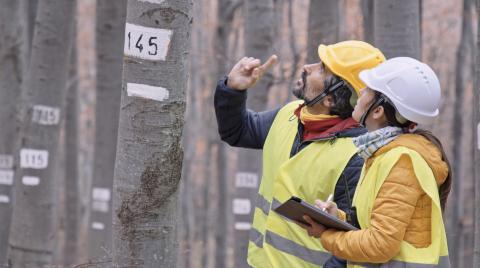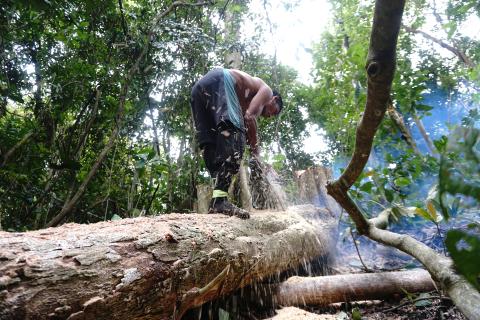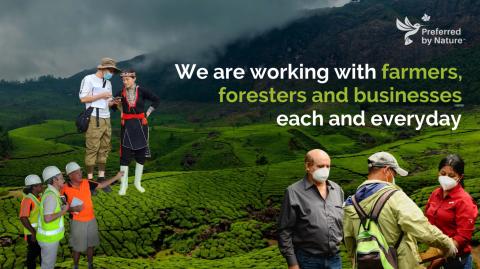Tears, sweat, and optimism
“I’m in this for the long haul”, says Kasper Kopp, referring to his timber trading business TRACER ApS. The Danish company specialises in FSC-certified tropical timber and promotes Lesser Known Species in order to support sustainable tropical forest management.
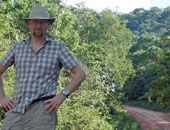 After many trials and tribulations, including two failed business start-ups and ten years of persistent door-knocking in the marketplace, his business idea is turning into a success.
After many trials and tribulations, including two failed business start-ups and ten years of persistent door-knocking in the marketplace, his business idea is turning into a success.
With a pronounced ‘never-give-up' mentality, Mr. Kopp has picked his own path and stuck to his project at times when others would have lost faith.
The current success was certainly hard to predict from the beginning.
“When I started this business, supplies were very limited and there were absolutely no demands for our products”, recalls Kasper Kopp. “It was set up in spite of everything”.
The turning point
Why did Mr. Kopp choose this line of business when the prospects looked so bleak? “As a Forest Engineer student, I was drawn to the concept of close-to-nature forestry which was far from mainstream in Denmark at that time", he explains.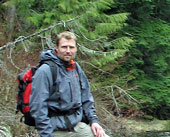 "I still think Danish forestry and the timber sector missed a golden opportunity by writing off certification for too long. The fact that most of our primary processing industries have closed down since then is in my opinion a consequence of that reluctance”.
"I still think Danish forestry and the timber sector missed a golden opportunity by writing off certification for too long. The fact that most of our primary processing industries have closed down since then is in my opinion a consequence of that reluctance”.
“My insight in conventional forestry was a turning point for me, I did not find it sustainable. Being young and idealistic I decided to build a business that would bridge the gap between sustainable forest management and the market. So I went in search of a business partner to realise the idea”.
The answer came in the shape of Thomas Harttung, a Danish estate owner who was pioneering continuous cover forestry in Denmark and using his own property as a testing ground. Mr. Harttung’s forest became FSC certified, and in 2001 the two formed a partnership around the processing and sale of local FSC certified timber. “Unfortunately, neither the scale of production nor the timing was right, so we had to end the initiative”, Kasper Kopp relates.
While Mr. Harttung went on to found a new business focusing on carbon sequestration and other aspects, Kasper Kopp insisted on making a living from sustainable timber trade.
”I decided to focus on trading tropical timber", he says. He then became the Scandinavian representative of the Swiss company Precious Woods, which owns forest and sawmills in the Amazon and is deeply involved in sustainable timber trade including Lesser Known Species.
Premature market
”I traveled around to Scandinavian timber importers, presenting a number of species and varieties. But I had very little success. In contrast to the Netherlands, Scandinavians normally use impregnated wood for outdoor purposes and they are very tradtional when it comes to tropical timber species. This proved a great barrier to our sales. Some saw FSC-certified timber as a threat to their business. Others found the idea premature. A small group of buyers were positive towards FSC, but they had to convince their clients who preferred the traditonal species.
Along with supply problems, the disappointing response by the Scandinavian importers seemed to form an unsurmountable challenge. However, as Mr. Kopp realised that this set-up did not work, he devised a new way forward for his idea. ”I thought, how do I break the ice? Then I decided to educate and build the market in Scandinavia by becoming a timber importer myself. So I effectively became my own buyer,” he explains.
”I thought, how do I break the ice? Then I decided to educate and build the market in Scandinavia by becoming a timber importer myself. So I effectively became my own buyer,” he explains.
And in 2005, four years after he first entered sustainable timber trade, he established the company TRACER – Traceable Certified Forest Products.Since then, Mr Kopp has gradually built his relations with FSC timber suppliers around the world and developed a market in Northern Europe.
Building the case for Lesser Known Species
Tatajuba. Muiracatiara. Mukulungu. These are just a few of the exotic trade names of the Lesser Known Species currently on offer from Tracer. One of the key challenges for the company is the promotion of Lesser Known Species.
”Awarenesss of the issues surrounding tropical timber and the alternatives to traditional species are the basis for market change”, says Mr. Kopp.
"The use of Lesser Known Species is an inherent part of sustainable tropical forest management. The market has to recognise this and start using a wider range of the timber species and varieties available in tropical forests”.
Tracer's popular catalogue of timber species currently on offer from the company. Tracer also publishes the more general Rough guide to traceable certified forest products.
A developing market
”Architects and advisors are crucial in determining whether certified timber is used in a construction project or not. I am happy to note that the awareness of the value of certified wood and the acceptance of Lesser Known Species has finally taken off in recent years.We now have a number of reference projects, which also makes promotion easier”.
For example, Tracer has supplied FSC Tatajuba – a Lesser Known Species – to various major projects in Copenhagen and recently delivered FSC Cumaru to a new campus built by the medicinal giant Novo Nordisk.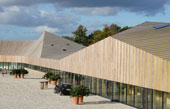
Novo Nordisk campus using Cumaru timber.
The public sector potentially plays an important role in pushing the demands for certified, however according to Kasper Kopp the impact of the public sector is not strong in Denmark. ”The Danish public procurement guidelines for timber do stress certified wood, but unfortunately they are voluntary”, notes Kasper Kopp. ”The market needs serious support from the decision-makers. The Danish timber market would be different if our political leaders had the nerve to issue some mandatory guidelines”.
Alongside his direct contact with clients and prospects, Mr. Kopp has been instrumental in founding and building FSC-Denmark and its Business Forum. He assumed the role of Chairman of the Board of FSC-Denmark throughout eight years. The activities of FSC-Denmark have resulted in a high level of consumer recognition of the FSC label among the Danes.
A worthwhile journey
Despite many setbacks and challenges, Mr. Kopp remains convinced that his business journey has been worth the effort.
”I went into this line of trade because I wanted to contribute to sustainable forest management”, he says. ”I can say with some confidence that we have not only moved some trees, but we have also moved attitudes and helped raise demands for sustainable timber. It’s an ongoing process, and we are still far from the ideal situation. But so far, so good!”.
Tracer has experienced an annual growth of 30% during the past few years of general recesssion in the construction sector. “With our determined strategy to specialise on FSC certified Lesser Known Species, we are gaining market shares and thereby timber from sustainable forests is gaining market, too. This was and is the core of my business idea“, Kasper Kopp concludes.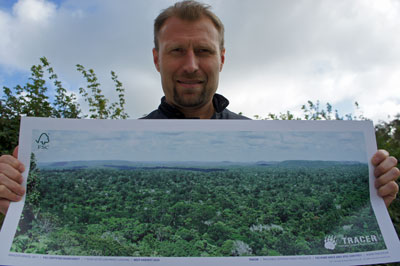
Tracer ApS imports and trades around 30 timber species, of which 25 are Lesser Known Species from South America and Africa. The customers are primarily traders, construction projects and producers, mainly located in Denmark and neighbouring countries. Tracer holds an FSC Chain of Custody certificate issued by the Rainforest Alliance, based on third-party assessments conducted by NEPCon.
